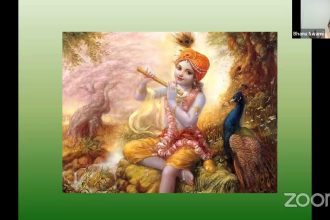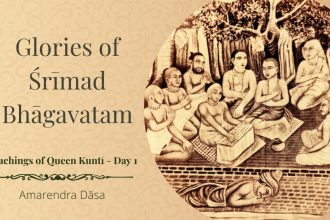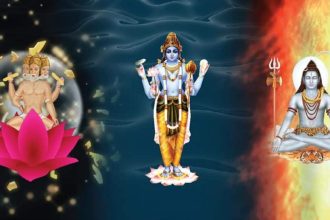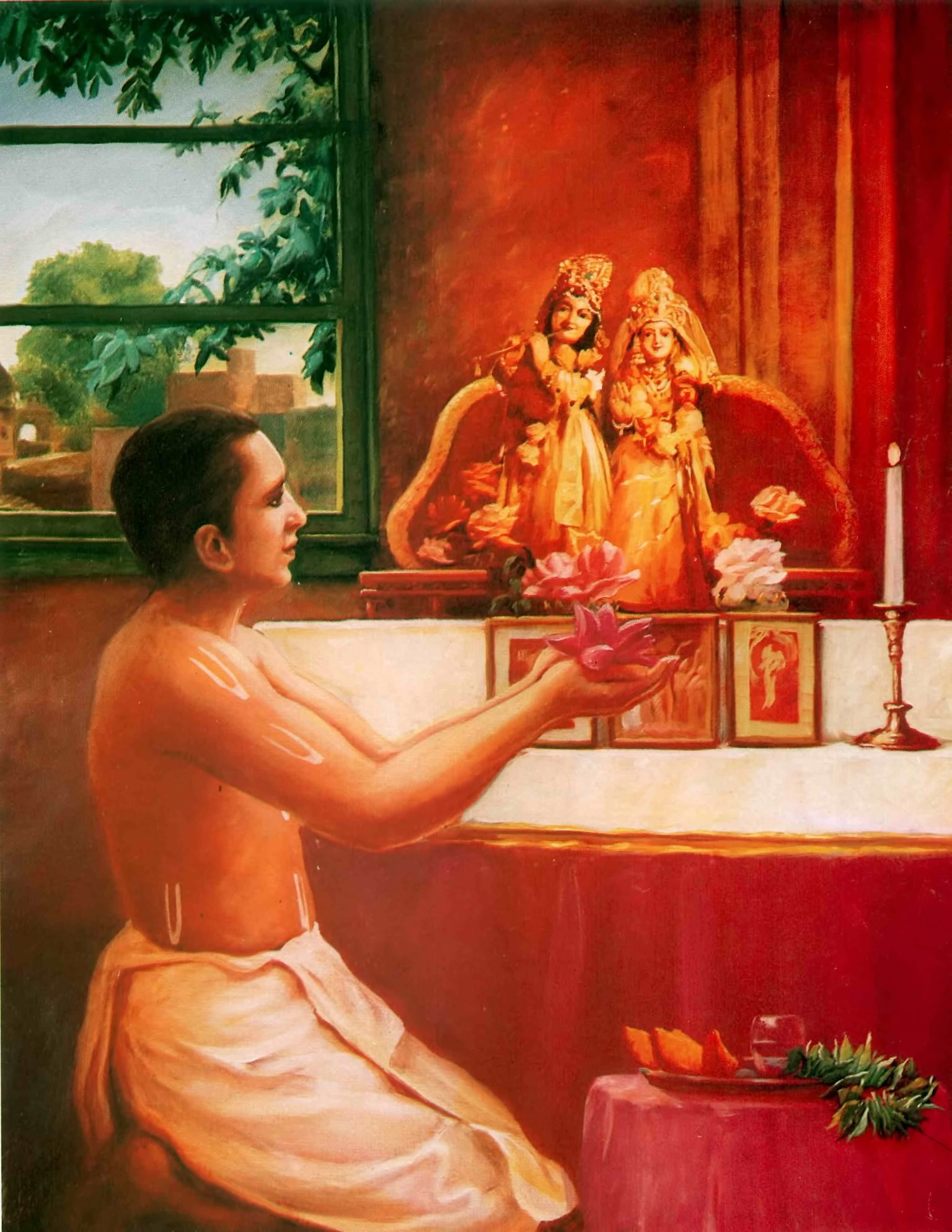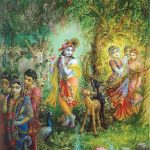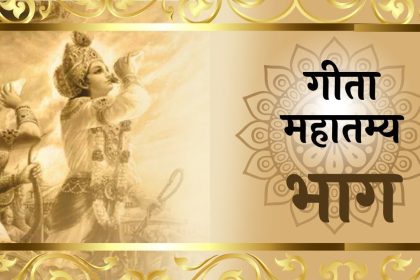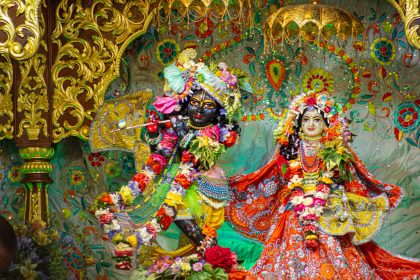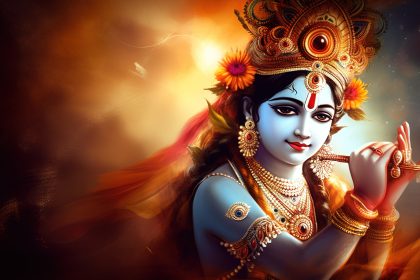(5) Arcanam – Worship of the Deity
After pāda-sevanam comes the process of arcanam, worship of the Deity. If one is interested in the process of arcanam, one must positively take shelter of a bona fide spiritual master and learn the process from him. There are many books for arcana, especially Nārada-pañcarātra. In this age, the pañcarātra system is particularly recommended for arcana, Deity worship. There are two systems of arcana—the bhāgavata system and pāñcarātrikī system. In the Śrīmad-Bhāgavatam there is no recommendation of pāñcarātrikī worship because in this Kali-yuga, even without Deity worship, everything can be perfectly performed simply through hearing, chanting, remembering and worship of the lotus feet of the Lord. Rūpa Gosvāmī states:
śrī-viṣṇoḥ śravaṇe parīkṣid abhavad vaiyāsakiḥ kīrtane
prahlādaḥ smaraṇe tad-aṅghri-bhajane lakṣmīḥ pṛthuḥ pūjane
akrūras tv abhivandane kapi-patir dāsye ‘tha sakhye ‘rjunaḥ
sarvasvātma-nivedane balir abhūt kṛṣṇāptir eṣāṁ param
“Parīkṣit Mahārāja attained salvation simply by hearing, and Śukadeva Gosvāmī attained salvation simply by chanting. Prahlāda Mahārāja attained salvation by remembering the Lord. The goddess of fortune, Lakṣmīdevī, attained perfection by worshiping the Lord’s lotus feet. Pṛthu Mahārāja attained salvation by worshiping the Deity of the Lord. Akrūra attained salvation by offering prayers, Hanumān by rendering service, Arjuna by establishing friendship with the Lord, and Bali Mahārāja by offering everything to the service of the Lord.” All these great devotees served the Lord according to a particular process, but every one of them attained salvation and became eligible to return home, back to Godhead. This is explained in Śrīmad-Bhāgavatam.
It is therefore recommended that initiated devotees follow the principles of Nārada-pañcarātra by worshiping the Deity in the temple. Especially for householder devotees who are opulent in material possessions, the path of Deity worship is strongly recommended. An opulent householder devotee who does not engage his hard-earned money in the service of the Lord is called a miser. One should not engage paid brāhmaṇas to worship the Deity. If one does not personally worship the Deity but engages paid servants instead, he is considered lazy, and his worship of the Deity is called artificial. An opulent householder can collect luxurious paraphernalia for Deity worship, and consequently for householder devotees the worship of the Deity is compulsory. In our Kṛṣṇa consciousness movement there are brahmacārīs, gṛhasthas, vānaprasthas and sannyāsīs, but the Deity worship in the temple should be performed especially by the householders. The brahmacārīs can go with the sannyāsīs to preach, and the vānaprasthas should prepare themselves for the next status of renounced life, sannyāsa. Gṛhastha devotees, however, are generally engaged in material activities, and therefore if they do not take to Deity worship, their falling down is positively assured. Deity worship means following the rules and regulations precisely. That will keep one steady in devotional service. Generally householders have children, and then the wives of the householders should be engaged in caring for the children, just as women acting as teachers care for the children in a nursery school.
Gṛhastha devotees must adopt the arcana-vidhi, or Deity worship according to the suitable arrangements and directions given by the spiritual master. Regarding those unable to take to the Deity worship in the temple, there is the following statement in the Agni Purāṇa. Any householder devotee circumstantially unable to worship the Deity must at least see the Deity worship, and in this way he may achieve success also. The special purpose of Deity worship is to keep oneself always pure and clean. Gṛhastha devotees should be actual examples of cleanliness.
Deity worship should be continued along with hearing and chanting. Therefore every mantra is preceded by the word namaḥ. In all the mantras there are specific potencies, of which the gṛhastha devotees must take advantage. There are many mantras preceded by the word namaḥ, but if one chants the holy name of the Lord, he receives the result of chanting namaḥ many times. By chanting the holy name of the Lord, one can reach the platform of love of Godhead. One might ask, then what is the necessity of being initiated? The answer is that even though the chanting of the holy name is sufficient to enable one to progress in spiritual life to the standard of love of Godhead, one is nonetheless susceptible to contamination because of possessing a material body. Consequently, special stress is given to the arcana-vidhi. One should therefore regularly take advantage of both the bhāgavata process and pāñcarātrikī process.
Deity worship has two divisions, namely pure and mixed with fruitive activities. For one who is steady, Deity worship is compulsory. Observing the various types of festivals, such as Śrī Janmāṣṭamī, Rāma-navamī and Nṛsiṁha-caturdaśī, is also included in the process of Deity worship. In other words, it is compulsory for householder devotees to observe these festivals.


